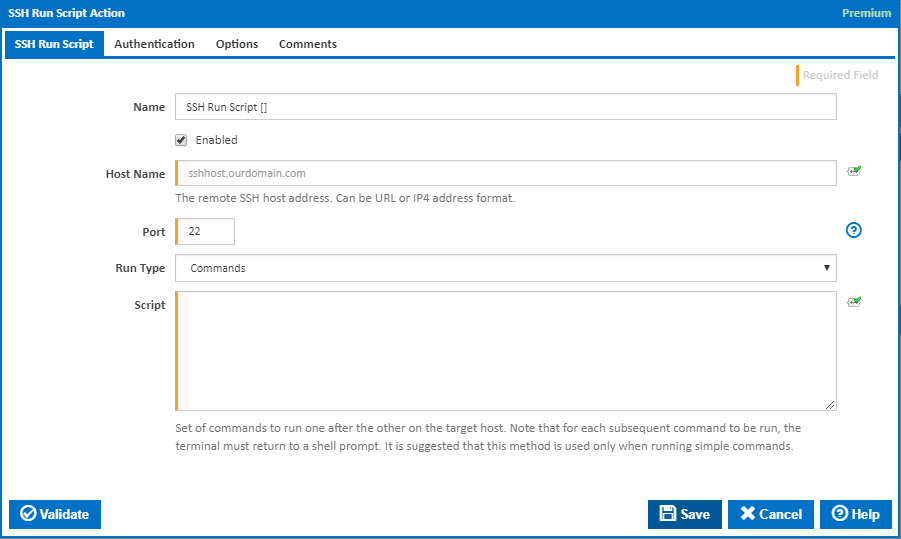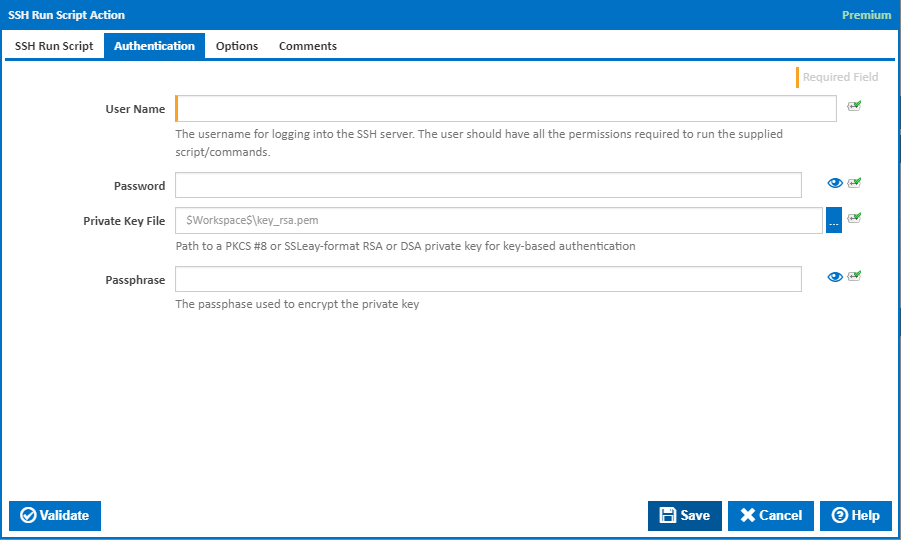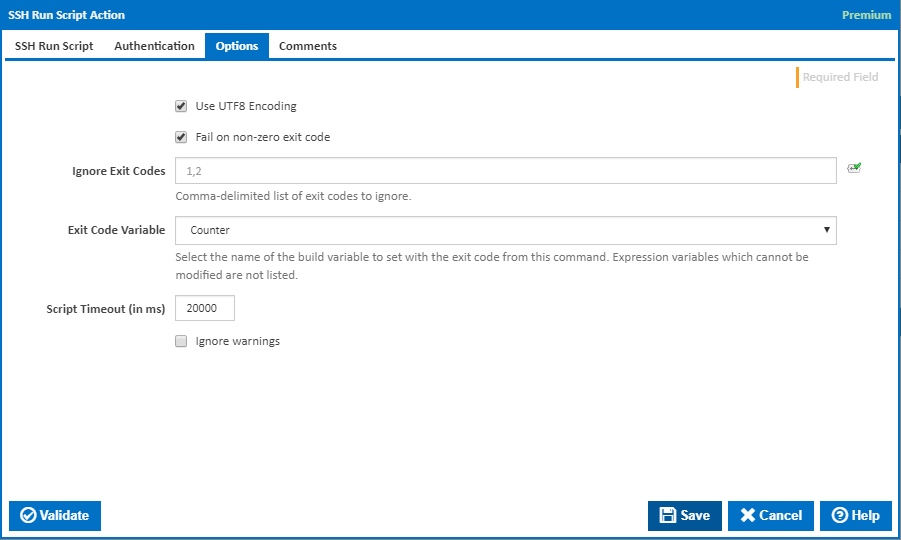The SSH Run Script action is a premium action which used to run scripts on an SSH server. The action can either run an entire script or a list of commands. All output is written to the build log as it is received from the host.
SSH Run Script
Name
A friendly name for this action (will be displayed in the actions workflow area).
Enabled
Determines if this action will be run within the relevant stage.
Host Name
The URL or IPv4 address of the SSH host to connect to. The host should be accessible from all agents able to run the build containing this action. If any connection issues are detected they will appear in the build log. Action will connect and represent itself as an xterm client. In addition it will use a channel to send commands so that it can easily detect when they have been completed. If a script is
used in the action, SFTP will be used to upload the script to the host for execution. This guarantees that the script runs in the context of the host, and does not have to deal with any translation issues between the actions client and the server. Once run the script file will be removed from the SSH host.
Port
The port number that the SSH host will be listening on. Port 22 is the default port for SSH hosts.
Run Type
Select whether you want to specify a sequence of Commands or a Script File to run.
Script
This text area is shown when the Commands option is selected for the Run Type. Enter a list of commands to run one after the other on the target host. When run, the action will open a channel once connected and proceed to call each command in sequence waiting for the previous command to complete. Once all commands have been run, the channel and connection will be closed and the action will completed, returning the exit code of the last run command.
Note: For each subsequent command to be run, the terminal must return to a shell prompt. It is suggested that this method is used only when running simple commands.
Script File
This input box is shown when the Script file option is selected for the Run Type. Enter the path to the script file.
When the action is run, the script file is uploaded to the SSH host using SFTP and placed in the base directory of the logged in user. The script is then updated to be executable and executed under the users account. This requires the user to be able to write and execute files in their base directory. The action will then wait for the script to complete before setting the Exit Code Variable to the last error code of the script, and then closing the channel and connection.
Convert any Windows newlines (CLRF) in script file to UNIX newlines (LF)
This is shown when the Script file option is selected for the Run Type. If this is ticked, any Windows newlines (CLRF) in script file are converted to UNIX newlines (LF).
Clean up script after run
If this is ticked, the script file will be removed after run is cleaned up.
Authentication
Username
The username under which all the commands will be run. The user will only be logged in for the lifetime of the action.
Password
The password for the supplied user. This password is stored as an encrypted value within the action and once entered cannot be read by those editing the action. It will also not appear in any logs.
Private File Key
If the host uses SSH keys, the file containing the key can be supplied here. The action supports several private key formats: PKCS #8, OpenSSH/OpenSSL and PuTTY .ppk.
PKCS #8 keys
Encrypted Example:
-----BEGIN ENCRYPTED PRIVATE KEY-----
MIIBpjBABgkqhkiG9w0BBQ0wMzAbBgkqhkiG9w0BBQwwDgQINGy1T4l5EpQCAggA
MBQGCCqGSIb3DQMHBAg6pbq0RezDVQSCAWDx7hriZBN1U7lYlBAQw7V0lpwn3mzL
cyUFc+tfQ9U7KYXw5PxZUobYWIrQiFXAymVFBgi+IWRyXgNwKbtUxmkavslsI3DU
Xtee+XzsgMJ1TSN/PJpfNM7/y5o1jxp6LZU88wKo43AQCSdlAu9cDgzbWaL2bBAY
MihGto6+Bs1kL4bkHsHUVNz2fcWhbwwTqN6EjxC9wbppn+3lXdFOM6T/KrvPdZqa
AjX+EoD5RIKLEVCzTjx+OLTmkdXsAuwEGlW2Kih5jdeHL5cBu8wGbCa+wH9z+OBg
k2Q2+dErX60KAk/YApXkoET/bEFm40t+UO8HfaETk907lECfFrgpUU7/7MYOwZwK
mlPdAqC6+UCi0aEN2uIZ1WV+MK7laJaeD+Co9VZgsTHz8Egg5kZXq9e43c5DVjTo
wDrJ6GtaTFJYSgrjVpv+7eAkUdsP3ChXEUpYHCU1cEZ97gcgVbtlubwE
-----END ENCRYPTED PRIVATE KEY-----
Unencrypted Example:
-----BEGIN PRIVATE KEY-----
MIIBVQIBADANBgkqhkiG9w0BAQEFAASCAT8wggE7AgEAAkEAqqEXkcDqDLopGKCD
mPIIgmeSnTGMHZNfzHiaizHf8ruQmbxXh95qCY4LHC5/Bx3HNkWbE7XUW0oGJLOw
LLeHswIDAQABAkBRa8ecdKr64caEiuvhCvXGjHfo7ODIqC+ZmZ9ddrI/2Dt2QdIs
Dx1sLxKoSfvC/ppyt5DcaqQTIpvv/9QBdeIBAiEAyFI7WgkwyRWko1BM15y+fqyR
sieYNEwP1D/EleWlMQECIQDaDiR163FkcqJ/9VzcVHBhVrqE9qnQcL/a2yMmJzJE
swIgFJoAaJ4RWlzTdchIXtRL8xMkWMIhsR8xcY6tVQ0tFAECIQDAcvTpAghNAAO9
bV8ssnWQ40uxKEZNygT58qg99yAdkwIhAJk67u3r0AZOSMGkXqtS3KI2oJMO8JCw
m6PS1MOl91aZ
-----END PRIVATE KEY-----
PuTTY .ppk keys
Example:
PuTTY-User-Key-File-2: ssh-rsa
Encryption: none
Comment: ssh-rsa-key-20170905
Public-Lines: 2
AAAAB3NzaC1yc2EAAAADAQABAAAAQQCqoReRwOoMuikYoIOY8giCZ5KdMYwdk1/M
eJqLMd/yu5CZvFeH3moJjgscLn8HHcc2RZsTtdRbSgYks7Ast4ez
Private-Lines: 4
AAAAQFFrx5x0qvrhxoSK6+EK9caMd+js4MioL5mZn112sj/YO3ZB0iwPHWwvEqhJ
+8L+mnK3kNxqpBMim+//1AF14gEAAAAhAMhSO1oJMMkVpKNQTNecvn6skbInmDRM
D9Q/xJXlpTEBAAAAIQDaDiR163FkcqJ/9VzcVHBhVrqE9qnQcL/a2yMmJzJEswAA
ACEAmTru7evQBk5IwaReq1Lcojagkw7wkLCbo9LUw6X3Vpk=
Private-MAC: e4378e86478e8f1cdd2fb1bbb634965104a8808c
OpenSSH/OpenSSL (SSLeay) keys
Example:
-----BEGIN RSA PRIVATE KEY-----
MIIBOwIBAAJBAKqhF5HA6gy6KRigg5jyCIJnkp0xjB2TX8x4mosx3/K7kJm8V4fe
agmOCxwufwcdxzZFmxO11FtKBiSzsCy3h7MCAwEAAQJAUWvHnHSq+uHGhIrr4Qr1
xox36OzgyKgvmZmfXXayP9g7dkHSLA8dbC8SqEn7wv6acreQ3GqkEyKb7//UAXXi
AQIhAMhSO1oJMMkVpKNQTNecvn6skbInmDRMD9Q/xJXlpTEBAiEA2g4kdetxZHKi
f/Vc3FRwYVa6hPap0HC/2tsjJicyRLMCIBSaAGieEVpc03XISF7US/MTJFjCIbEf
MXGOrVUNLRQBAiEAwHL06QIITQADvW1fLLJ1kONLsShGTcoE+fKoPfcgHZMCIQCZ
Ou7t69AGTkjBpF6rUtyiNqCTDvCQsJuj0tTDpfdWmQ==
-----END RSA PRIVATE KEY-----
Passphrase
If the private key was encrypted with a passphrase it should be placed in this field. The passphrase is encrypted when stored in the database, and will not appear in any logs.
Options
Use UTF8 Encoding
If this is ticked, UTF8 encoding is used when communicating with the SSH server.
Character Encoding Name
Visible only if 'Use UTF8 Encoding' is not ticked.
Enter the international standard name for the encoding of the response from your SSH server. See Encoding for full list. Leave blank to use the current code page on the agent operating system.
Fail on non-zero exit code
If this is ticked, a non-zero exit code causes the action to fail.
Ignore Exit Codes
The list of exit codes to ignore (comma-delimited).
Exit Code Variable
Select a build variable to store the last exit code received from the script or commands that were run. All commands are run through an SSH channel. After running all the commands supplied, the channel returns its exit status.
Expression variables which cannot be modified are not listed.
Continue running next command on failure
Visible only if 'Command' Run Type is selected under the 'SS Run Script' tab.
If this is ticked, the next command continues to run on failure.
Script timeout
The time in milliseconds to wait before the action should timeout when waiting for a response from the host.
Ignore warnings
If this is ticked, any warnings logged will not mark the action with a warning status.


